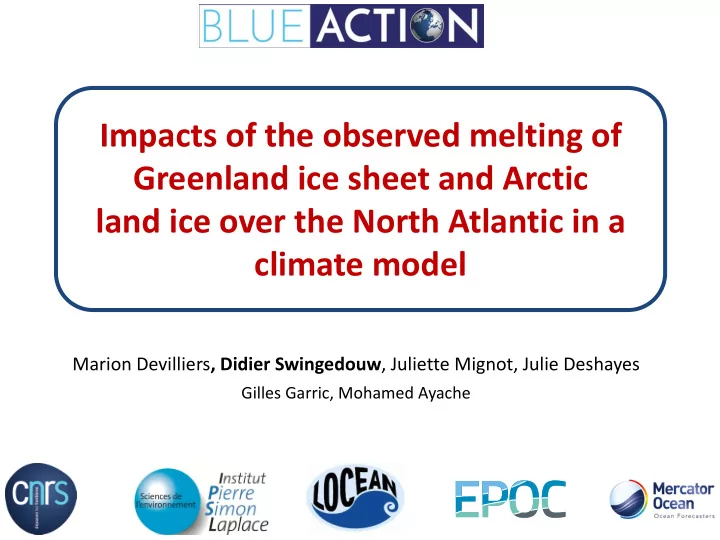

Impacts of the observed melting of Greenland ice sheet and Arctic land ice over the North Atlantic in a climate model Marion Devilliers , Didier Swingedouw , Juliette Mignot, Julie Deshayes Gilles Garric, Mohamed Ayache
What is the AMOC? AMOC : Atlantic Meridional Overturning Circulation Rahmstorf 2002
What is the AMOC? AMOC : Atlantic Meridional Overturning Circulation Buckley and Marshall (2016) Rahmstorf 2002
Is the AMOC important for climate and society? Representative impacts of an AMOC substantial weakening Confidence in process Sense of the change understanding increase high medium decrease low Physical system Biological system Oxygenation Human systems Temperature Droughts Storminess trend Oceanic carbon Vegetation Migration pressure Agriculture and and acidification Cyclones Precipitation Cryospheric due to degradation Marine Sea-level rise food production Wetland methane in livelihoods frequency and flooding changes ecosystems
Is the AMOC weakening? Observed relative SST changes q Is the AMOC already weakening? q Paleodata (Thornalley et al. 2018) and SST fingerprints (Caesar et al. 2018) say « possibly » (estimate of 3±1 Sv weakening or 15% decrease ) q CMIP5 models exhibit -1.4 ±1.4 Sv of decrease between 2006-2015 AMOC in CMIP5 (historical + RCP8.5) and 1850-1900 q No Greenland ice sheet (GrIS) melting included in the historical simulations q What is the forced signal from GrIS melting?
GrIS melting and SSS trend q There is a decreasing trend in SSS in the North Atlantic (Friedman et al. 2017) q The freshwater release from the Greenland ice sheet is strongly increasing (Bamber et al. 2018) in the Friedman et al. 2017 recent decades but also in the 1920s (Box and Colgan 2013) q Is there a link between the two? (not clear, e.g. Yang et al. 2016 vs. Dukhovskoy et al. 2019) Bamber et al. 2018
Experimental design q Use of Bamber et al. (2018) recent reconstruction q Extension back to 1840 following Box and Colgan (2013) q Overwrite runoff and calving in the the Greenland region by those observation- based fluxes q Use of 5 members of historical simulations including this melting since 1920 q Comparison with historical simulations from IPSL-CM6 starting from same initial conditions
Spread of the freshwater anomalies q Use of a passive tracer to evaluate the pathways from the melting at the coast of Greenland (following a climatology of the runoff) q Propagation of the passive tracer reminiscent of SSS changes, but not exactly the same: the changes in currents have also modified the salinity field, which is an active tracer
Convection sites modifications q There are two main convection sites in IPSL-CM6A: one in the Nordic Seas and one in the Labrador Sea q Sporadic convection in the Irminger Sea, which seems to be reinforced by the addition of melting at the end of the simulations q Opposing effects from Nordic Seas and Irminger Sea for deep water formation
Impacts on the ocean circulation q The AMOC is slightly affected by the freshwater trends q It weakens by less than 1 Sv q The barotropic circulation is modified with: A northward and zonal shift of the Gulf • Stream An intensification of the subpolar gyre • around the Irminger Sea, in line with the convection change An increase in transpolar current and • increase of Atlantic water in the Arctic
SST Melting-historical 1984-2014 Impacts on the centennial trend in active tracers q Clear signature on SST reminiscent of observations (e.g. Caesar et al. 2018) q The forced trends in the North Atlantic are more in line with observations (to be confirmed…)
Conclusions and outlooks q Including a better representation of GrIS freshwater input impacts the on-going trends in the North Atlantic q It brings forced SSS trend in the same direction as observation (but still compatible with internal variability) and improve SST trend (if forced…) q A very slight impact on the AMOC (< 1 Sv) q Need for a more formal framework to detect any changes in active tracer fields and AMOC ⇒ detection-attribution framework applied to the North Atlantic
Thank you! Courtesy of Bruno Ferron, OVIDE 2010
SSS trend without NAO and AMV signal 03/06/2019 14
q SSS changes
03/06/2019 16
Recommend
More recommend